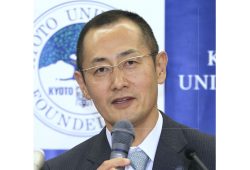- Yomiuri Editorial
- Discrimination in entrance exams
Reforms needed to help women play key role at medical facilities
12:32 JST, May 12, 2022
The discrimination against women that has continued in medical school entrance exams is being reviewed. It is also urgent to improve the workplace environment, in addition to entrance exams, so that women can play an active role on the front lines of medicine.
According to a survey by the Education, Culture, Sports, Science and Technology Ministry, the average pass rate for women at universities with a medical faculty stood at 13.60% for the 2021 academic year, higher than the 13.51% for men and marking the first time that women have outperformed men since comparable data became available in the 2013 academic year.
It was revealed in 2018 that Tokyo Medical University had reduced the entrance exam scores of women and people who were trying again to enter the university after graduating from high school, suppressing the number of successful examinees among these groups. Similar situations were discovered at other universities, resulting in a string of cases in which additional examinees were accepted or people sought a refund of their exam fees.
In response, the education ministry established rules prohibiting all faculties, including medical schools, from discriminating against people based on gender and age in entrance exams. At the same time, universities began working to conceal the names and genders of examinees when deciding on their success or failure, and to add women to the ranks of interviewers.
The higher pass rate among women appears to reflect the fact that universities have revised their selection methods to emphasize fairness in entrance exams. Gender and age should not affect the success or failure of examinees. It can be said that proper reforms for entrance exams have been promoted.
It is important for universities to make efforts to further increase the transparency of decisions on the success or failure of examinees, through such measures as disclosing average scores separately for men and women. The government also needs to keep an eye on universities to prevent such discrimination from happening again.
Currently, female doctors account for only about 20% of the total. The challenge for the future will be how to encourage the greater number of successful female examinees to play an active role in the medical field.
Many students who graduate from medical school enter the ikyoku medical offices of university hospitals under their training program. The discrimination in entrance exams is believed to have been spurred by universities’ concern that if more female doctors leave hospitals due to marriage or childbirth, hospitals’ operations would be hindered.
The medical field needs personnel who are physically strong and capable of working long hours. There are fewer women among surgeons and emergency physicians who perform operations or answer emergency calls.
It is important for each hospital to establish a system in which both men and women can work together with peace of mind in all medical departments, through such measures as providing childcare facilities within hospitals and reducing or eliminating night shifts for members of the child-rearing generation.
It is also essential to review working hours. According to a survey by the government, nearly 40% of hospital doctors worked more than 960 hours of overtime a year. If long working hours remain the norm, women will not be able to balance their work with childbirth and child-rearing, leading to a spate of female doctors leaving hospitals and causing a shortage of doctors.
In April 2024, the government will begin to promote work style reforms for doctors. Improving the work environment for doctors as a whole will likely help women play an active role in the medical field.
(From The Yomiuri Shimbun, May 12, 2022)
Top Articles in Editorial & Columns
-

40 Million Foreign Visitors to Japan: Urgent Measures Should Be Implemented to Tackle Overtourism
-

University of Tokyo Professor Arrested: Serious Lack of Ethical Sense, Failure of Institutional Governance
-

Policy Measures on Foreign Nationals: How Should Stricter Regulations and Coexistence Be Balanced?
-

China Provoked Takaichi into Risky Move of Dissolving House of Representatives, But It’s a Gamble She Just Might Win
-

PM Takaichi Should Help Young Japanese Break Seniority Barrier to Vitalize Politics
JN ACCESS RANKING
-

Japan Institute to Use Domestic Commercial Optical Lattice Clock to Set Japan Standard Time
-

Israeli Ambassador to Japan Speaks about Japan’s Role in the Reconstruction of Gaza
-

Man Infected with Measles May Have Come in Contact with Many People in Tokyo, Went to Store, Restaurant Around When Symptoms Emerged
-

Prudential Life Insurance Plans to Fully Compensate for Damages Caused by Fraudulent Actions Without Waiting for Third-Party Committee Review
-

Woman with Measles Visited Hospital in Tokyo Multiple Times Before Being Diagnosed with Disease




















